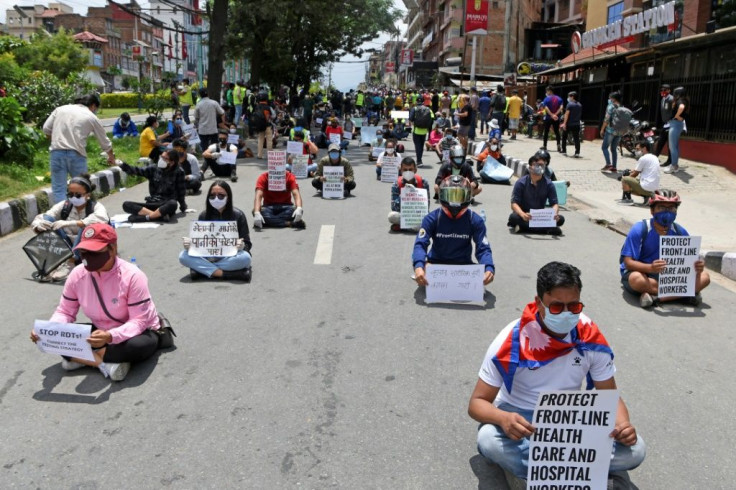Amid Covid-19 Pandemic, Nepal’s Low-Caste Dalits Suffer From Surge In Violence

KEY POINTS
- Police have arrested almost three dozen people in connection with the Soti killings
- Nepal abolished the caste system in 1963
- UN high commissioner for human rights, Michelle Bachelet, also condemned the latest killings.
Along with the ongoing covid-19 pandemic, the Himalayan nation of Nepal is experiencing a rise in caste-based discrimination.
Although the Nepali government explicitly bans such discrimination, the recent killings of members of the lowest caste, the Dalits, has led to protests in the country.
On May 23, B.K. Nawaraj, a 21-year-old Dalit man from the Jajarkot District, accompanied by 18 of his friends, journeyed to the village of Soti in the West Rukum district in order to marry a higher-caste 17-year-old girl from the Malla clan. (The girl had already been slated to marry another man)
But upon arrival, Nawaraj and his friends were attacked by the girl's relatives and local villagers, leaving six youths dead and 13 others wounded. The dead boys’ bodies were then thrown into the nearby Bheri River.
Police have arrested almost three dozen people in connection with the killings. They have been charged with murder, attempted murder, and caste-based discrimination. Three other people, including the would-be bride and her mother, were charged with complicity in the killings.
Umesh Shrestha, a local journalist, told Deutsche Welle of Germany: "If the boy was from a caste higher than the Dalit, the villagers in Soti wouldn't have attacked them in such a way.”
One day before the Soti killings, a 13-year Dalit girl named Angira Pasi was allegedly raped by a 25-year-old neighbor named Birenda Bhar, who belongs to a higher caste. That incident took place in the Rupandehi district of southern Nepal. But village residents and a local official named Amar Bahadur Chaudhary decided that Pasi should marry Bhar and live with him.
Subsequently, members of Bhar's family allegedly beat the young girl to death, with Pasi's family claiming the Bhars tried to disguise the girl's death as a suicide.
Although Nepal abolished the caste system in 1963 and banned caste discrimination in 2006, Dalits continue to suffer prejudice, discrimination and violence. They are specifically prohibited from marrying people of higher castes.
Nepal Monitor, a human rights organization, has recorded two dozen incidents of caste-based violence and discrimination since March 23 when the country went into lockdown due to covid-19.
Dhana Kumari Sunar, a Dalit rights activist and former member of Nepal’s National Women Commission, said these incidents were part of a "pandemic of the caste system.” She also fears that social distancing rules – designed to curb the spread of covid-19 – may be used to intensify such discrimination.
"We have long faced caste-based discrimination," she said. "Now, the social-distancing norms could be a pretext to justify the pariah practice."
Other organizations -- including the National Dalits Commission, the National Human Rights Commissioner and even the United Nations – have condemned these acts.
The mass murder in Soti were "yet another manifestation of the continued prevalence of caste-based discrimination in Nepal," said UN resident coordinator Valerie Julliand.
The UN high commissioner for human rights, Michelle Bachelet, also condemned the latest killings.
“It is distressing that caste-based prejudices remain deeply entrenched in our world in the 21st century, and I am filled with sadness for these two young people who held high hopes of building a life together despite the obstacles presented by their accident of birth,” she said.
The killings sparked protests by Dalit groups in the capital city Kathmandu – in defiance of ongoing social distancing measures.
Ironically, Nepal’s ruling Communist Party came to power partly on the premise that it would uphold the rights of marginalized communities like the Dalits.
The National Human Rights Commission noted that Dalit children often drop out of school and remain trapped in poverty. Dalits are often barred from temples or from attending non-Dalit funerals. Dalits often cannot access water wells used by the upper-caste.
At least 25 Dalits have been killed for violating caste-based rules since 2011 -- at least five of those murder cases were linked to inter-caste marriages.
Mohna Ansari, a spokeswoman for the National Human Rights Commission of Nepal, said caste-based violence can only end when the authorities prosecute the culprits.
"Those who have the power to take action are those from higher castes. Until authorities take this seriously, nothing will change," Ansari said.
Sunar agreed: "Until and unless higher-caste people actively support our movements to end this, cases like what happened in Soti will continue to take place.”
The Nepalese government has now formed an independent committee to probe the Soti killings.
Manjit Tamrakar, former acting president of the National Dalit Commission, characterized the Soti incident a “Dalit massacre.”
“They [the government] are trying hard to prove that it was not due to caste-based discrimination,” he said.
Bishwo Bhakta Dulal, a Dalit activist, said: “Most of the Dalit murder cases are due to love affairs or marriage to upper castes. Nepali society is based on [the] caste system. This is the reason, despite constitutional guarantees, impunity for caste-based discrimination and violence remains high.”
Meenakshi Ganguly, South Asia director for Human Rights Watch, noted that Nepali police seldom investigate crimes where Dalits are victims.
“Nepal has laws against caste-based crimes but they are rarely applied, and often the police refuse to even register cases – such as rape – when the victim is a Dalit,” said Ganguly. “The alleged role of local politicians in these cases can lead to obstruction of justice, which means that an independent investigation is essential.”
Ganguly added: “These horrific crimes continue because the government has failed for too long to protect its most vulnerable citizens.”
© Copyright IBTimes 2025. All rights reserved.





















